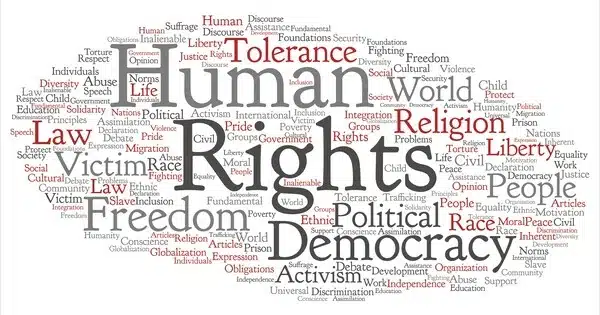Human rights are fundamental rights and liberties to which all people are entitled by virtue of their humanity. They are frequently regarded as universal, inalienable, and inherent in all people, regardless of nationality, race, religion, gender, or other characteristics. Governments, international organizations, and various legal and moral frameworks protect and promote human rights.
Human rights are moral principles or norms governing certain standards of human behavior that are routinely protected by municipal and international law. They are commonly understood as inalienable, fundamental rights “to which a person is inherently entitled simply because she or he is a human being” and “inherent in all human beings” regardless of age, ethnic origin, location, language, religion, ethnicity, or any other status.
Some of the most widely recognized human rights include:
- Right to Life: Every person has the right to life, and no one shall be arbitrarily deprived of their life.
- Freedom from Torture and Inhuman Treatment: Individuals have the right to be free from torture, cruel, inhuman, or degrading treatment or punishment.
- Freedom of Speech and Expression: People have the right to express their thoughts, ideas, and opinions freely without censorship or punishment.
- Right to Liberty and Security: Individuals cannot be subjected to arbitrary arrest or detention, and they have the right to be secure in their person and property.
- Right to a Fair Trial: Everyone has the right to a fair and public trial by an impartial tribunal when charged with a criminal offense.
- Freedom of Thought, Conscience, and Religion: People have the right to practice any religion or belief system of their choice, and they can change their beliefs or religion freely.
- Right to Education: Access to education is a fundamental right, and primary education should be compulsory and available to all.
- Right to Work and Fair Labor Practices: Everyone has the right to work, to just and favorable conditions of work, and to protection against unemployment.
- Right to an Adequate Standard of Living: This includes the right to food, clothing, housing, and medical care.
- Right to Equality: Individuals should be treated equally and without discrimination based on race, color, sex, language, religion, political or other opinion, national or social origin, property, birth, or other status.
These rights are enshrined in a number of international treaties, including the 1948 Universal Declaration of Human Rights (UDHR) adopted by the United Nations General Assembly. Furthermore, many countries have their own legal frameworks and constitutions that safeguard human rights at the national level.
They are universal in the sense that they apply everywhere and at all times, and they are egalitarian in the sense that they are the same for everyone. They are viewed as requiring empathy and the rule of law, as well as imposing an obligation on individuals to respect the human rights of others, and they are generally regarded as not being taken away except as a result of due process based on specific circumstances.















